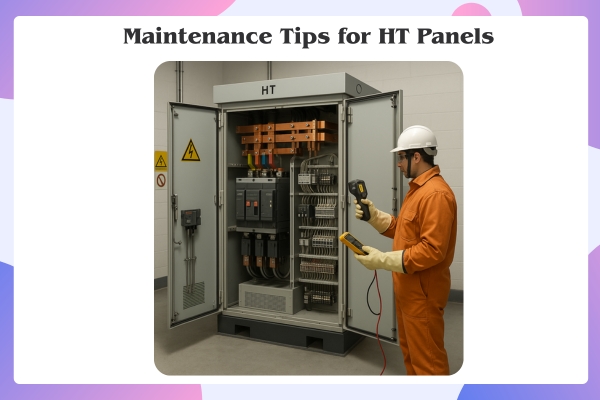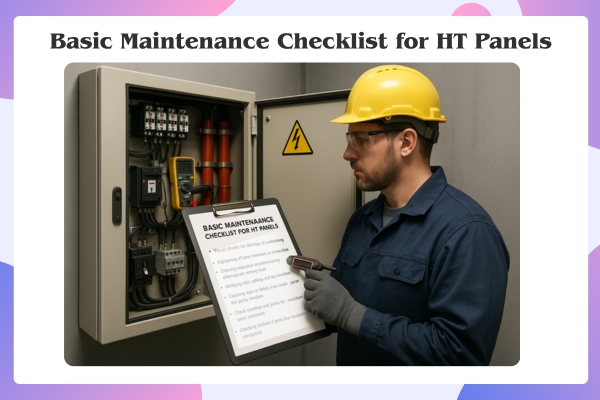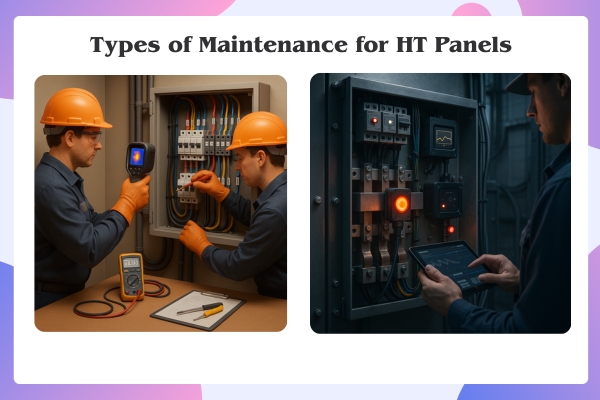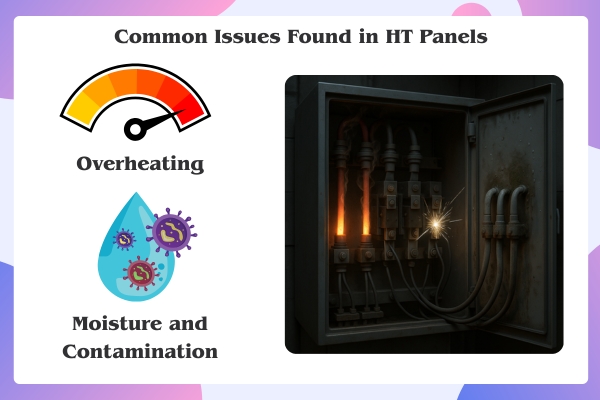Maintenance Tips for HT Panels

Introduction
If you’re managing a power facility, an industrial plant, or even a large commercial building, you already know how important it is to keep your electrical systems reliable. At the core of these systems sit HT panels. These high-tension panels handle large voltage loads and distribute electricity efficiently across units or buildings. Just like any critical equipment, they require attention at regular intervals.
Neglecting maintenance doesn’t just put the equipment at risk. It threatens safety, disrupts operations, and increases the chance of expensive failures. This guide will walk you through practical maintenance tips for HT panels that support both long life and safe performance. Whether you’re an engineer, a technician, or a facility owner, these steps are written to help you work smarter, not harder.
HT Panel Maintenance Tips for Longevity and Safety
HT panels play a major role in electrical distribution systems, especially in industrial, utility, and commercial environments. Maintenance Tips for HT Panels: Ensuring Longevity and Safety can help engineers, technicians, and facility managers avoid equipment failures, safety hazards, and power disruptions. Getting maintenance right is more about consistency than complexity. A good approach makes the equipment last longer and keeps operations stable.
Facilities that rely on uninterrupted power can’t afford sudden panel issues. Regular maintenance ensures the load gets distributed properly, safety systems stay responsive, and downtime is kept to a minimum. Whether you’re responsible for a manufacturing plant, a hospital, or a multi-storey commercial building, knowing how to maintain HT panels is part of keeping things running smoothly.
Why HT Panel Maintenance Needs Attention
High Tension panels manage power at levels that demand precision. Any fault can trigger major losses or put personnel at risk. Failures often trace back to things that went unchecked for too long. Loose connections, worn insulation, outdated relay settings all of these can cause trouble if ignored.
Routine upkeep gives teams control over performance and safety. It also reduces emergency repairs. In many industrial settings, these systems are expected to run without fail. That’s a big ask unless someone is checking and testing them regularly.
Getting equipment from a trusted HT panel manufacturer in India like DJ Electro Controls means the foundation is already strong. Pairing this with regular service routines helps extend the life of your panel systems and avoid costly surprises.
Basic Maintenance Checklist for HT Panels

A checklist keeps tasks clear and helps avoid missed steps. Below are essential activities most maintenance teams include in their routines:
- Visual checks for damage or overheating
- Tightening of loose terminals or connectors
- Checking insulation resistance using appropriate testing tools
- Verifying relay settings and trip functions
- Cleaning dust or debris from inside the panel housing
- Checking busbars and joints for moisture or corrosion
These tasks form the base. Depending on your panel design, you might have to add equipment-specific steps. Teams using a list like this regularly can spot and fix minor issues early.
Understanding HT Panel Functionality
Knowing how HT panels work helps make sense of the maintenance process. HT panels are control units that distribute electricity above 11 kilovolts to different systems within a facility. They also provide safety features like fault detection, isolation, and system shutdowns during critical loads.
The Functions of HT Panels go beyond simple distribution. They involve protection relays, metering units, voltage transformers, and circuit breakers. Understanding the main functions of HT panel systems helps maintenance teams target the right parts at the right time.
When these components are serviced properly, the entire system becomes more stable. Inspections get more accurate when the team knows what they are looking at and why it matters.
Scheduled Activities and Time Intervals
It is easier to keep things in shape when each task has a time slot. Spread out maintenance activities based on risk level, system load, and age of the panel.
Daily or weekly checks:
- Visual scans for wear or smell of burning
- Indications on meters and relay displays
Monthly checks:
- Thermographic inspection for hot spots
- Mechanical tightening of joints
- Moisture or dust accumulation reviews
Quarterly or half-yearly checks:
- Megger test on cables
- Trip test for protective relays
- Earthing continuity tests
Annually:
- Comprehensive relay testing
- Overhaul of circuit breakers
- Full control wiring check
Following this kind of timetable ensures reliability without creating overload on your maintenance team.
Mistakes to Avoid During HT Panel Maintenance
Some issues come up again and again. Being aware of them helps prevent future breakdowns.
- Skipping relay function tests because the system seems fine
- Cleaning without powering down fully
- Not recording past test results or work logs
- Over-tightening connectors, which leads to cracks
- Using the wrong test instruments for the panel voltage rating
Each of these mistakes can result in system instability or failure. A well-trained team working with proper records avoids these pitfalls easily.
Types of Maintenance for HT Panels

Preventive Maintenance
Preventive maintenance involves inspections and servicing tasks performed on a set schedule. This includes checking insulation, measuring panel temperature using thermal tools, tightening connections, and confirming that protective devices are operational.
Technicians often record readings such as insulation resistance and breaker contact wear. These numbers act as early warnings and help reduce future repair costs.
Predictive Maintenance
Predictive tasks depend on performance data. For example, if a sensor records an unusual rise in temperature near a busbar, the system alerts you to a possible loose joint or failing contact. In facilities using advanced monitoring tools, predictive maintenance allows teams to address issues before they become critical.
Common Issues Found in HT Panels

Overheating
One of the most common problems is overheating due to poor ventilation, excess load, or loose terminals. It often leads to insulation failure, which then puts the whole system at risk.
Arcing and Faulty Contacts
Electrical arcing can result from loose terminals or damaged components.If not fixed early, this may result in short circuits, equipment damage, and even fire.
Moisture and Contamination
Dust, moisture, or pests can compromise the insulation and lead to electrical tracking. This is especially common in coastal or humid areas.
FAQs
Q1. How often should HT panels be maintained?
Answer: Routine checks should be done daily, with detailed inspections scheduled monthly and yearly.
Q2. Who should maintain HT panels?
Answer: Qualified electrical technicians or engineers with knowledge of high-voltage systems should carry out maintenance.
Q3. What tools are used in HT panel servicing?
Answer: Insulation testers, thermal scanners, relay testers, and torque wrenches are commonly used.
Q4. Can HT panels be cleaned while powered?
Answer: No. Always de-energise the system before cleaning or inspecting internal parts.
Q5. How long do HT panels last with proper upkeep?
Answer: With regular servicing, panels can operate efficiently for 15 to 20 years or more.
Q6. What is the ideal insulation resistance value?
Answer: It varies by design, but values above 1 MΩ are typically considered safe.
Q7. Should seasonal changes affect maintenance plans?
Answer: Yes. Monsoon and summer months require more frequent checks due to heat and humidity.
Conclusion
Maintaining an HT panel is not just about ticking off a checklist. It’s about preventing risk, protecting people, and avoiding disruption in power flow. By investing time in scheduled inspections and following safety steps, your equipment will stay dependable and safe for years.
Whether you’re managing a busy industrial unit or overseeing a commercial building, keep your panels in check. If you need professional assistance, DJ Electro Controls is ready to support you with experience and dependable service.

